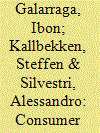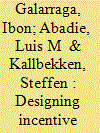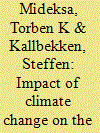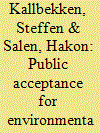|
|
|
Sort Order |
|
|
|
Items / Page
|
|
|
|
|
|
|
| Srl | Item |
| 1 |
ID:
171424


|
|
|
|
|
| Summary/Abstract |
Improved energy efficiency can help reduce pollution, contribute to energy security, and help consumers save money. This paper explores energy labelling schemes as a policy instrument for promoting energy-efficient cars in Spain. Specifically, it explores consumer responses to changes in vehicle prices. We derive the demand responses for two different efficiency labelling schemes: absolute and relative. To that end, we calculate own- and cross-price elasticities of demand for cars with efficiency labels on the Spanish car market. The results show that the elasticities for more efficient cars are in general higher. However, in the specific case of sedans, the elasticities depend on assumptions about how consumers decide which car to purchase. If consumers are concerned about the absolute energy performance of cars independently of other attributes, and thus pay attention to absolute labelling, demand for more efficient cars is more elastic than demand for less efficient cars. If consumers choose the car segment first and then the energy performance, using the relative label, the opposite result is found. The results suggest that both relative and absolute labelling schemes can be useful, depending on how consumers make their decisions. It might also be possible to design a mixed system.
|
|
|
|
|
|
|
|
|
|
|
|
|
|
|
|
| 2 |
ID:
150823


|
|
|
|
|
| Summary/Abstract |
The energy-efficiency gap has been high on research and policy agendas for several decades. Incentive schemes such as subsidies, taxes and bonus-malus schemes are widely used to promote energy-efficient appliances. Most research, however, considers instruments in isolation, and only rarely in the context of political constraints on instrument use, or for alternative policy goals. This paper presents a methodology for the optimal design of incentive schemes based on the minimisation of Dead Weight Loss for different policy goals and policy restrictions. The use of the methodology is illustrated by designing optimal combinations of taxes and subsidies in Spain for three types of appliance: dishwashers, refrigerators and washing machines. The optimal policies are designed subject to different policy goals such as achieving a fixed reduction in emissions or a certain increased market share for efficient appliances, and for policy constraints such as budget neutrality. The methodology developed here can also be used to evaluate past and current incentive schemes.
|
|
|
|
|
|
|
|
|
|
|
|
|
|
|
|
| 3 |
ID:
133294


|
|
|
|
|
| Publication |
2014.
|
| Summary/Abstract |
Large-scale deployment of low-carbon energy technologies is crucial to mitigating climate change, and public support is an important barrier to policies and projects that facilitate deployment. This paper provides insights to the origins of public opposition that can impede the adoption of low-carbon technologies by investigating how perceptions are shaped by local economic interests and individual cultural worldviews. The research considers both carbon capture and storage and wind energy technologies because they differ in maturity, economic impact and resource base. Further, for each technology, the research examines support for two types of policies: deployment in local community and public funding for research and development. Results indicate the influence of economic interests and cultural worldviews is policy specific. Individual cultural worldviews do not affect support for the deployment of technology, but they do significantly influence a person×s support for publicly funded research and development. Conversely, local economic interests have a significant role in determining support for deployment, while they do not affect support for research and development.
|
|
|
|
|
|
|
|
|
|
|
|
|
|
|
|
| 4 |
ID:
065293


|
|
|
| 5 |
ID:
096724


|
|
|
|
|
| Publication |
2010.
|
| Summary/Abstract |
Climate change will impact electricity markets through both electricity demand and supply. This paper reviews the research on this topic. Whereas there is much that remains unknown or uncertain, research over the last few years has significantly advanced our knowledge. In general, higher temperatures are expected to raise electricity demand for cooling, decrease demand for heating, and to reduce electricity production from thermal power plants. The effect of climate change on the supply of electricity from non-thermal sources shows great geographical variability due to differences in expected changes to temperature and precipitation. Whereas the research frontier has advanced significantly in the last few years, there still remains a significant need for more research in order to better understand the effects of climate change on the electricity market. Four significant gaps in the current research are regional studies of demand side impacts for Africa, Asia, the Caribbean and Latin America, the effects of extreme weather events on electricity generation, transmission and demand, changes to the adoption rate of air conditioning, and finally, our understanding of the sensitivity of thermal power supply to changes in air and water temperatures.
|
|
|
|
|
|
|
|
|
|
|
|
|
|
|
|
| 6 |
ID:
097517


|
|
|
|
|
| Publication |
2010.
|
| Summary/Abstract |
Climate change will impact electricity markets through both electricity demand and supply. This paper reviews the research on this topic. Whereas there is much that remains unknown or uncertain, research over the last few years has significantly advanced our knowledge. In general, higher temperatures are expected to raise electricity demand for cooling, decrease demand for heating, and to reduce electricity production from thermal power plants. The effect of climate change on the supply of electricity from non-thermal sources shows great geographical variability due to differences in expected changes to temperature and precipitation. Whereas the research frontier has advanced significantly in the last few years, there still remains a significant need for more research in order to better understand the effects of climate change on the electricity market. Four significant gaps in the current research are regional studies of demand side impacts for Africa, Asia, the Caribbean and Latin America, the effects of extreme weather events on electricity generation, transmission and demand, changes to the adoption rate of air conditioning, and finally, our understanding of the sensitivity of thermal power supply to changes in air and water temperatures.
|
|
|
|
|
|
|
|
|
|
|
|
|
|
|
|
| 7 |
ID:
104979


|
|
|
|
|
| Publication |
2011.
|
| Summary/Abstract |
While strongly recommended by economists, it has often been politically difficult to impose taxes on externalities. There is a substantial literature on public attitudes towards environmental taxes. There has, however, been few comprehensive attempts to understand attitudes towards environmental taxes.
The main research question in this paper is which factors influence support for fuel taxation. We propose a model of attitudes towards fuel taxation, and test this model as well as more specific hypotheses, using data from a representative survey of the adult Norwegian population.
Our results suggest that support for fuel taxation is best predicted by beliefs about environmental consequences, followed by beliefs about consequences to others. Beliefs about consequences to self (self-interest) is the factor that explains the least variation in support for fuel taxation.
The academically interesting result that support cannot be well explained without capturing a broad range of motivational factors is also highly policy relevant. It implies that there is no magic formula for increasing public support for environmental taxes. There are, however, some issues which can be addressed: trust in how well the government spends the revenue, and the perception that taxation does very little to change behaviour and thus to reduce environmental problems.
|
|
|
|
|
|
|
|
|
|
|
|
|
|
|
|
| 8 |
ID:
149941


|
|
|
|
|
| Summary/Abstract |
Wind power development projects often include compensation for the affected communities, but little is known about the efficacy of the alternative compensation mechanisms. This study addresses this question by examining the relative potential of private and public compensation. We conduct a Choice Experiment (CE) that investigates household preferences of compensation for the local siting of a hypothetical wind park. Households chose among different alternatives, where each alternative was characterized by three varying attributes: the number of turbines, the level of private compensation, and the level of public compensation. Results indicate the wind park imposes welfare losses to local residents and non-local recreational users, with about 35% of these losses corresponding to non-use values. Findings show that households prefer public compensation to private compensation, with household’s willingness to accept being lower with public compensation than private compensation. This finding suggests that estimates of local resistance to wind development depends on the compensation mechanism.
|
|
|
|
|
|
|
|
|
|
|
|
|
|
|
|
|
|
|
|
|